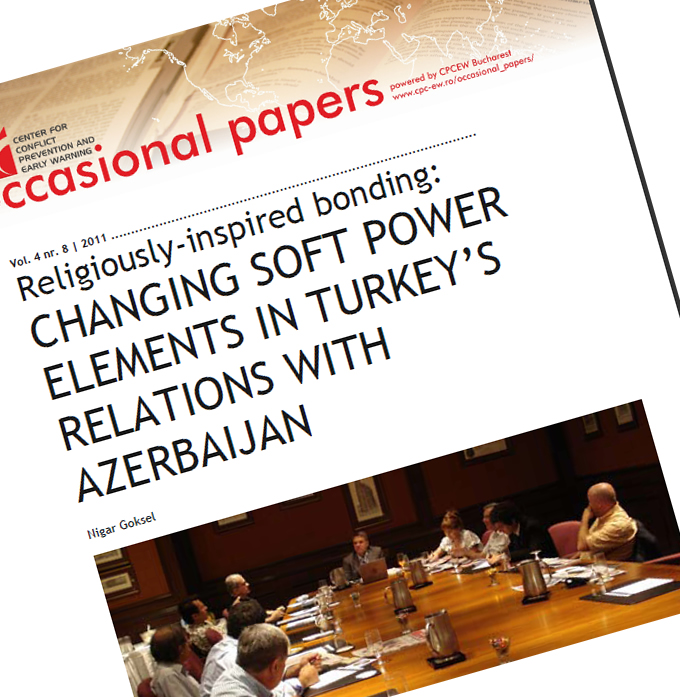by Nigar Goksel
Religiously-inspired bonding: CHANGING SOFT POWER ELEMENTS IN TURKEY’S RELATIONS WITH AZERBAIJAN
Background
Turkish public sensitivities and political outreach towards the Muslims of the Caucasus region have always been there. However, this general sympathy has been channeled into more concrete involvement and has had more effect in recent years. More than 20 years after Azerbaijan’s independence from the Soviet Union, and 10 years of Turkey being governed by a relatively more „religiously informed” government than was the case in Turkish Republican history, this article examines the changing role of religion in Turkey-Azerbaijan relations.
Turkish involvement in religious affairs in Azerbaijan is done primarily through two channels – one is the official Directorate of Religious Affairs in Turkey and the other is the Fethullah Gülen movement, also called the Nurcu’s because the Gülen teachings draw on Said Nursi’s writings. The Turkish Directorate of Religious Affairs has financed the construction of a number of mosques (eight according to most sources) and trains clergy from Azerbaijan in Turkey, as well as setting up schools in Azerbaijan to train clergy – in collaboration with the Turkish Ministry of Education and Foreign ministry.
The work of the Gülen movement is harder to qualify or quantify – and its interaction with government policies also much more complex. The Gülen Movement was founded by and is led by a Turkish Islamic scholar/preacher named Fethullah Gülen who lives in Pennsylvania. Through companies, education institutions (schools and special training courses), dormitories, media outlets, and political connections, the Gülen movement’s presence in Azerbaijan has been growing consistently since Azerbaijan’s early years of independence. Across the country, they include primary and secondary schools, university preparation courses, and one university. Perceptions of this movement in Azerbaijan vary widely and are assessed from various sides in this article.
Read complete
More
 Post-Soviet Insecurity And Unrest In Russia’s North Caucasus Borderlands: Sources, Implications And Some Policy Recommendantions
Post-Soviet Insecurity And Unrest In Russia’s North Caucasus Borderlands: Sources, Implications And Some Policy Recommendantions
North Caucasus (hereinafter, NC) has been the most troubled part of the Post-Soviet Russian Federation (RF) due to historical, ethnic, religious and socio-political reasons dating back to the even pre-Soviet times. Unfortunately, NC is mostly known for its ethno-religious and political instability rather than its rich multicultural composition and scenic beauties which, otherwise, would promote the region as a noteworthy point of the world’s cultural and geographical heritage.
Achievement of stability and prosperity in the NC would be a beneficial target for all not only in the region but the rest of the world. However, despite the ostensible simplicity and desirability of this win-win objective, policies and attitudes of all interested parties ranging from the local inhibitants to Russian leaders and the West, do not necessarily end up in a coherent sum in reality. Examples of competition and cooperation exist simultaneously. Yet, there are a few examples of opportunity windows like Moscow’s recent adoption of socio-political reform initiatives or Russian-Turkish rapprochment or the European Union’s (EU) relatively growing interest in the region. These factors would help stabilize and further open the region to the world especially in a Western-style orientation. The responsibility of eliminating instability in the region lies foremost with the Russian leadership. Next, local inhibitants and international community bear their own responsibilities. Problems and their possible solutions in this region would also teach us some lessons that might help us explain and solve similar ethno-religious radicalization issues in other parts of the world through a longer historical perspective.
This chapter will examine the multiple historical, ethno-religious and socio-political roots of the instability in the NC and provide a discussion of its implications for the wider world in addition to a few policy recommendations for all major interested parties.
Read complet
More



